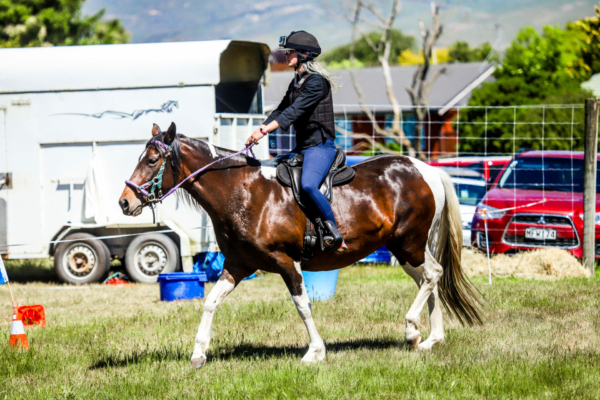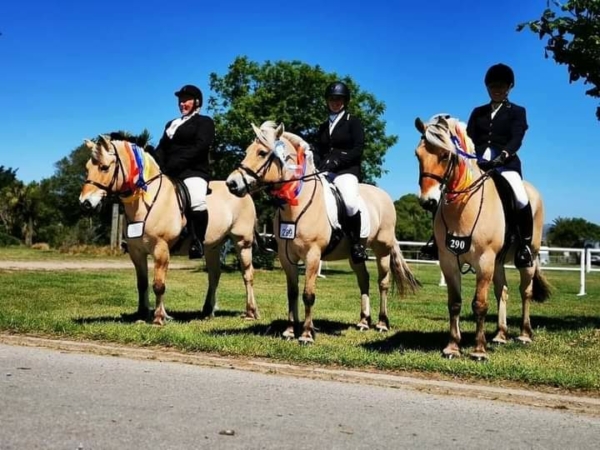
Tiger Horse “Love” as a young stallion back in the USA where he was bred. Now he lives in New Zealand and is the only breed of his kind in the country.
The Rare Breed Horse Society is calling for rare purebred owners to come together to showcase horses that may be the first or last of their kind in New Zealand. There are approximately 55 rare horse breeds in the country according to Liselle Silver, one of the Society’s founding who manages a census of rare breeds. She says the Otago Equine Expo in Mosgiel next month is a perfect opportunity to showcase some of them.
According to the Society, the criteria for ‘rare’ status is measured by the number of breeding mares only. There are four categories: ‘critical’ is less than 100 in New Zealand or 2000 globally; ‘at risk’ is less than 200 in New Zealand or 4000 globally; ‘vulnerable’ is less than 1000 in New Zealand and less than 10,000 globally. A further category, ‘breed of interest’ does not meet criteria as a rare breed but horses are of genetic or historic interest (such as Kaimanawa, Straight Egyptian Arabian).
Liselle says the rarest in New Zealand is the Tiger Horse (pictured above), an American breed of horse that traces back to ancient China, and she has recorded only one in the country. She says rare horse breeds are an obsession she has had since she was a child.
“I had a breed book as a kid and wished I could have one of them one day.”
However, growing up in a non-horsey family where the family pets were goldfish, it wasn’t until she was 29 years old that her dream finally came true.
Liselle bought a South American Paso Fino, Winnfarms Isla de Flores (named after the Island of Flowers, a little island off the coast of Panama), from Marti Winn, a breeder in Lincoln.

Liselle Silver and her Paso Fino mare Bee.
“They are gaited and really smooth to ride, and great for riders with sore backs or injuries where trotting and moment of suspension is a bit much for them. For riders without aches and pains, they’re just plain fun!”
Liselle says the Paso Fino are also considered to have ‘brio’ a spanish term meaning vigour.
“They give an alternative option to a trot which is smooth to ride and just comfortable and you don’t feel like you’re going to fall off. Its liking on a magic carpet and flying along like on a quad bike or something like that, it’s very different,” she says.
Another founding member, Megan Hopkinson has founded the Aotearoa New Zealand Norwegian Horse Manatōpū Incorporated. She says Norwegian Fjord horses are considered to be one of the world’s oldest domesticated horse breeds and were introduced to New Zealand in 1996. Megan organised the first rare horse breed trek run at Fairlie, earlier this year.
“We aim to have rare breeds out competing in all disciplines, and I would love to get a team of Fjords out competing in a ploughing match against Clydesdales,” she says. (While Clydesdales are common in New Zealand, internationally they are considered rare).
Recently, Liselle sat in on a meeting held by the Rare Breeds Survival Trust based in the UK, marketing equine versatility of rare breeds.
“Ten percent of people choose high performing warmblood horses, but 80 percent of them don’t need anything more than a native breed. They can do a lot, they can be the whole family’s horse, they can trek down the road, pull a wagon, can do trail rides or eventing and they can get a decent amount of competition. And they are safe and sensible.”

Norwegian Fjord horses after the European and native rare breeds classes Canterbury A&P Association Equestrian Event 2020. (L-R) Megan Hopkinson and Otto, Grace Best and Caroline – reserve champion ridden and Shaleena Wilson and Nanakia – Champion ridden.
Liselle says they also acclimatise generally well to New Zealand conditions.
“Native breeds cope with the temperature levels of New Zealand but as our grass is quite rich compared to a lot of their native environments. Diet, adequate exercise and managing grass intake is important, though many horses share these needs to avoid becoming overweight and or grass affected.”
She says she is looking forward to the Otago Equine Expo in Mosgiel on 28-29 October.
“This year we are hosting our first display under our own new Rare Horse Society of NZ where we hope to see all of those breeds as well as a few more!” says Liselle.
“If anyone has a rare pure bred, please reach out to arrange coming, or just to talk to us. We are doing our best to help provide pit stops along the way for those travelling from further afar.”
See website www.rarehorsesocietynz.org. and for more on the UK Rare Breeds Survival Trust https://clipchamp.com/watch/Q6J1l72MUtt